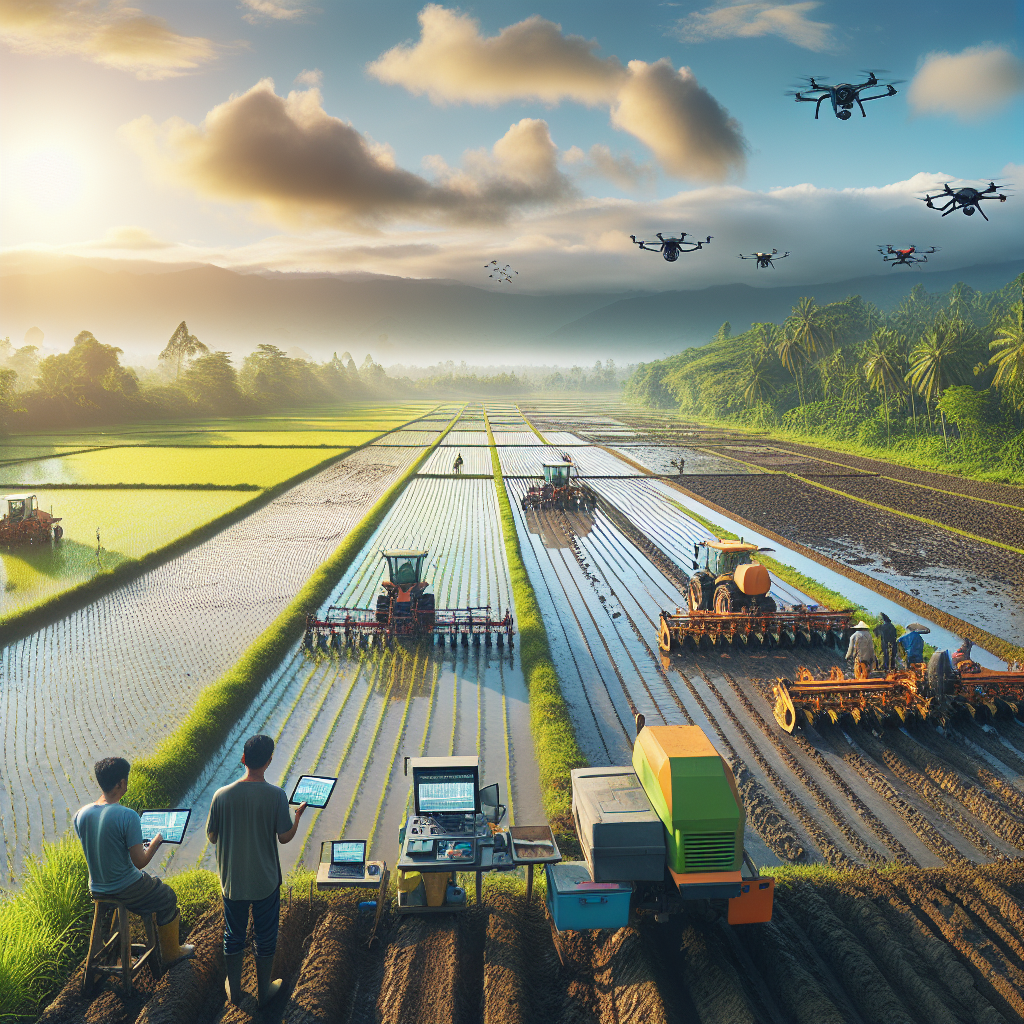Inovasi di sektor pertanian Indonesia: meningkatkan produktivitas, efisiensi, dan keberlanjutan pertanian melalui teknologi dan praktik baru.
Inovasi di Sektor Pertanian Indonesia
-
Table of Contents
- Introduction
- The Importance of Agriculture in Indonesia
- 1. Traditional Farming Practices
- 2. Government Initiatives
- Innovations in Indonesia’s Agricultural Sector
- 1. Technology Adoption
- 2. Sustainable Irrigation Systems
- 3. Crop Diversification and Management
- 4. Post-Harvest Processing and Value Addition
- Impact on the Economy and Food Security
- Conclusion
Introduction

Indonesia, with its vast agricultural resources and potential, has been striving to innovate and modernize its agricultural sector. The country’s agricultural industry plays a crucial role in its economy, providing employment opportunities for millions of people and contributing significantly to its GDP. In recent years, there has been a growing focus on innovation in the agricultural sector, with various initiatives and advancements aimed at improving productivity, sustainability, and overall efficiency. This article explores the innovations in Indonesia’s agricultural sector and their impact on the country’s economy and food security.
The Importance of Agriculture in Indonesia
Agriculture has always been a vital sector in Indonesia, employing a significant portion of the population and contributing to the country’s food security. The sector also plays a crucial role in poverty reduction and rural development. According to the World Bank, around 30% of Indonesia’s population is engaged in agriculture, and the sector accounts for approximately 14% of the country’s GDP.
1. Traditional Farming Practices
For many years, Indonesia’s agricultural sector relied heavily on traditional farming practices, which often resulted in low productivity and limited innovation. Small-scale farmers, who make up the majority of the agricultural workforce, faced numerous challenges such as limited access to modern technology, inadequate infrastructure, and lack of financial resources. These factors hindered the sector’s growth and prevented it from reaching its full potential.
2. Government Initiatives
Recognizing the need for innovation and modernization in the agricultural sector, the Indonesian government has implemented various initiatives to support farmers and promote technological advancements. One such initiative is the “Indonesian Agriculture Development Program,” which aims to improve the productivity and competitiveness of the agricultural sector through the adoption of modern farming techniques, improved irrigation systems, and the use of high-quality seeds and fertilizers.
The government has also established research and development institutions, such as the Indonesian Agency for Agricultural Research and Development (IAARD), to facilitate innovation in the sector. These institutions conduct research, develop new technologies, and provide training and support to farmers, enabling them to adopt more efficient and sustainable farming practices.
Innovations in Indonesia’s Agricultural Sector
In recent years, there have been several notable innovations in Indonesia’s agricultural sector, aimed at addressing the challenges faced by farmers and improving overall productivity. These innovations encompass various aspects of agriculture, including technology, irrigation, crop management, and post-harvest processing.
1. Technology Adoption
The adoption of modern technology has been a game-changer for Indonesian farmers. Mobile applications and online platforms have emerged, providing farmers with access to valuable information on weather patterns, market prices, and best farming practices. These digital tools enable farmers to make informed decisions, optimize resource allocation, and improve crop yields.
Furthermore, precision agriculture techniques, such as the use of drones and satellite imagery, have gained popularity in Indonesia. These technologies allow farmers to monitor crop health, detect pest infestations, and optimize fertilizer and pesticide application, resulting in higher yields and reduced environmental impact.
2. Sustainable Irrigation Systems
Water scarcity is a significant challenge in many parts of Indonesia, particularly during the dry season. To address this issue, innovative irrigation systems have been introduced to improve water efficiency and reduce wastage. One such system is the “System of Rice Intensification” (SRI), which promotes the use of less water while increasing rice yields. SRI has been successful in various regions of Indonesia, contributing to increased productivity and water conservation.
Additionally, the government has invested in the construction of reservoirs and dams to store water during the rainy season, ensuring a steady water supply for irrigation throughout the year. These initiatives have not only improved agricultural productivity but also helped mitigate the impact of climate change on the sector.
3. Crop Diversification and Management
Traditionally, Indonesia’s agricultural sector has been heavily reliant on a few key crops, such as rice, corn, and soybeans. However, there has been a growing emphasis on crop diversification to enhance food security and reduce the country’s dependence on imports. Farmers are encouraged to cultivate alternative crops, such as fruits, vegetables, and spices, which have higher market value and export potential.
Moreover, innovative crop management techniques, including integrated pest management and organic farming, have gained traction in Indonesia. These practices minimize the use of chemical pesticides and fertilizers, promoting sustainable agriculture and ensuring the production of safe and high-quality crops.
4. Post-Harvest Processing and Value Addition
Post-harvest losses have long been a challenge for Indonesian farmers, resulting in significant economic losses and food waste. To address this issue, there has been a focus on improving post-harvest processing and value addition in the agricultural sector. The government has invested in the establishment of modern processing facilities and cold storage infrastructure, enabling farmers to preserve and add value to their produce.
Furthermore, initiatives promoting agro-industries and agribusinesses have emerged, encouraging farmers to engage in value-added activities such as food processing, packaging, and branding. These initiatives not only reduce post-harvest losses but also create additional income opportunities for farmers and contribute to the overall growth of the agricultural sector.
Impact on the Economy and Food Security
The innovations in Indonesia’s agricultural sector have had a significant impact on the country’s economy and food security. Improved productivity and efficiency have led to increased agricultural output, reducing the country’s reliance on food imports and enhancing its self-sufficiency. This, in turn, has positively influenced the trade balance and reduced the vulnerability of the agricultural sector to external shocks.
Moreover, the adoption of sustainable farming practices has contributed to environmental conservation and the preservation of natural resources. By minimizing the use of chemical inputs and optimizing resource allocation, farmers are reducing their environmental footprint and promoting long-term sustainability.
The innovations in the agricultural sector have also created employment opportunities, particularly in rural areas. As farmers adopt modern technologies and engage in value-added activities, the demand for skilled labor in agriculture and related industries increases, leading to job creation and poverty reduction.
Conclusion
Innovation in Indonesia’s agricultural sector is crucial for the country’s economic growth, food security, and environmental sustainability. The government’s initiatives, coupled with the adoption of modern technologies and sustainable farming practices, have transformed the sector and empowered farmers to overcome traditional challenges. The innovations discussed in this article, ranging from technology adoption to crop diversification and post-harvest processing, have improved productivity, reduced post-harvest losses, and created new income opportunities. As Indonesia continues to invest in agricultural innovation, the sector’s potential for growth and contribution to the economy will only continue to expand.







